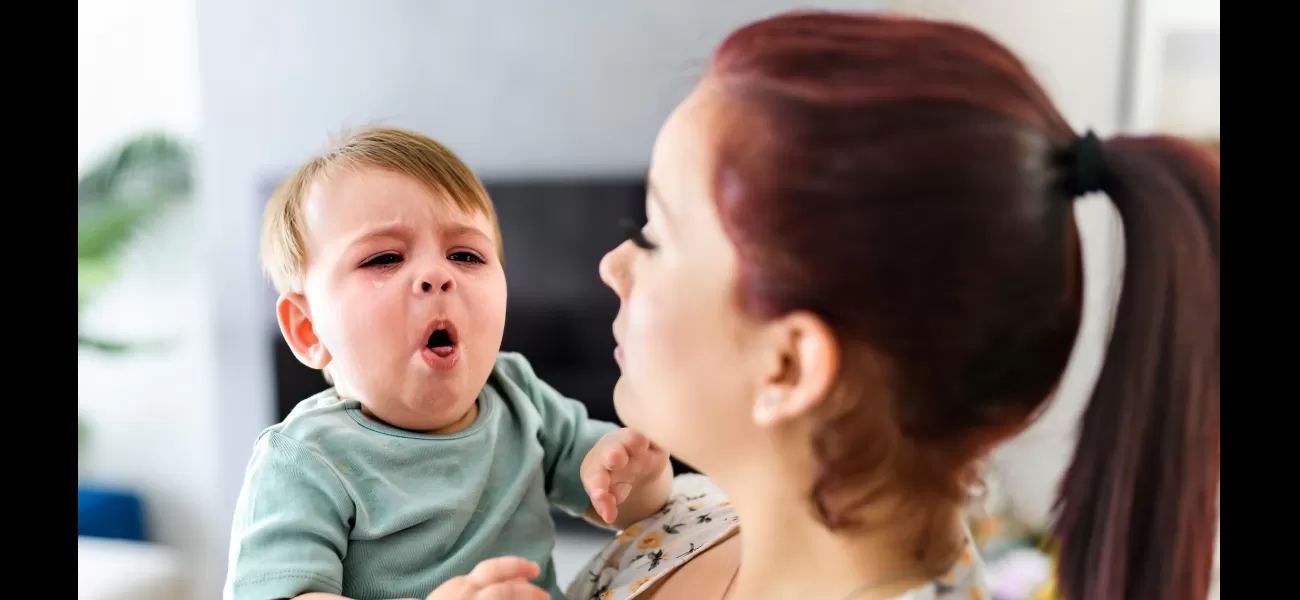Shortages prevent parents from purchasing whooping cough treatment.
Five infants have passed away from the illness in 2021.
May 19th 2024.

Around 3,000 cases of whooping cough have been confirmed so far, causing concern among health officials as it is the biggest outbreak in over a decade. Pharmacists are warning that crucial antibiotics used to treat this infection are in short supply, adding to the already alarming situation. This year alone, five babies have lost their lives to whooping cough and the number of confirmed cases has tripled compared to the previous year. With the number of cases continuing to rise, there is a growing worry about the spread of this highly contagious disease.
Dr Leyla Hannbeck, the chief executive of the Association of Independent Multiple Pharmacies, has expressed her concerns about the current shortage of antibiotics. Due to the surge in demand for treatment, patients are being turned away and unable to receive the necessary medication. The liquid form of clarithromycin, which is commonly prescribed for children, has been in short supply for several months. This has been an ongoing issue for the past two years, but the current epidemic of whooping cough has only added to the strain on supplies.
So, what exactly is whooping cough? Also known as pertussis, it is a bacterial infection that affects the lungs and breathing tubes. The most prominent symptom is a prolonged cough, earning it the nickname of the "100 day cough". Children are particularly susceptible to this infection and often make the characteristic "whoop" sound when coughing. This sound is caused by a gasp for breath and makes it easily identifiable. In severe cases, whooping cough can cause breathing difficulties, seizures, and even turn the skin blue or grey.
In adults, the symptoms of pertussis can be mistaken for a persistent cough, lasting for 10 weeks or longer. It usually starts with a runny nose or sore throat and then progresses to frequent coughing fits that can last for several minutes. Other symptoms may include difficulty breathing, redness in the face, and vomiting due to coughing up thick mucus. Those who are diagnosed with whooping cough are advised to stay at home and avoid going to work, school, or nursery for at least 48 hours after starting antibiotics or three weeks after the onset of symptoms.
One of the main concerns with whooping cough is how easily it can spread from person to person. As soon as someone begins to experience symptoms resembling a cold, they can easily spread the bacteria Bordetella pertussis to others. Dr. Hannbeck explains that while the shortage of antibiotics is not widespread, there are pockets across the country where it is becoming increasingly difficult to obtain these vital drugs. This has put pharmacists in a difficult position, as they may have to turn away mothers and children who are in need of treatment.
As a precautionary measure, some GP surgeries have started asking patients to wear face masks after a rise in whooping cough cases. This measure, resembling those taken during the COVID-19 pandemic, has been reintroduced after the tragic deaths of five babies from whooping cough this year. The UK Health Security Agency has confirmed this and Parkside Family Practice in Reading, Berkshire, has already implemented this rule for all patients. No one wants to see a resurgence of this deadly infection and it is important that we take necessary precautions to prevent its spread.
Dr Leyla Hannbeck, the chief executive of the Association of Independent Multiple Pharmacies, has expressed her concerns about the current shortage of antibiotics. Due to the surge in demand for treatment, patients are being turned away and unable to receive the necessary medication. The liquid form of clarithromycin, which is commonly prescribed for children, has been in short supply for several months. This has been an ongoing issue for the past two years, but the current epidemic of whooping cough has only added to the strain on supplies.
So, what exactly is whooping cough? Also known as pertussis, it is a bacterial infection that affects the lungs and breathing tubes. The most prominent symptom is a prolonged cough, earning it the nickname of the "100 day cough". Children are particularly susceptible to this infection and often make the characteristic "whoop" sound when coughing. This sound is caused by a gasp for breath and makes it easily identifiable. In severe cases, whooping cough can cause breathing difficulties, seizures, and even turn the skin blue or grey.
In adults, the symptoms of pertussis can be mistaken for a persistent cough, lasting for 10 weeks or longer. It usually starts with a runny nose or sore throat and then progresses to frequent coughing fits that can last for several minutes. Other symptoms may include difficulty breathing, redness in the face, and vomiting due to coughing up thick mucus. Those who are diagnosed with whooping cough are advised to stay at home and avoid going to work, school, or nursery for at least 48 hours after starting antibiotics or three weeks after the onset of symptoms.
One of the main concerns with whooping cough is how easily it can spread from person to person. As soon as someone begins to experience symptoms resembling a cold, they can easily spread the bacteria Bordetella pertussis to others. Dr. Hannbeck explains that while the shortage of antibiotics is not widespread, there are pockets across the country where it is becoming increasingly difficult to obtain these vital drugs. This has put pharmacists in a difficult position, as they may have to turn away mothers and children who are in need of treatment.
As a precautionary measure, some GP surgeries have started asking patients to wear face masks after a rise in whooping cough cases. This measure, resembling those taken during the COVID-19 pandemic, has been reintroduced after the tragic deaths of five babies from whooping cough this year. The UK Health Security Agency has confirmed this and Parkside Family Practice in Reading, Berkshire, has already implemented this rule for all patients. No one wants to see a resurgence of this deadly infection and it is important that we take necessary precautions to prevent its spread.
[This article has been trending online recently and has been generated with AI. Your feed is customized.]
[Generative AI is experimental.]
0
0
Submit Comment





